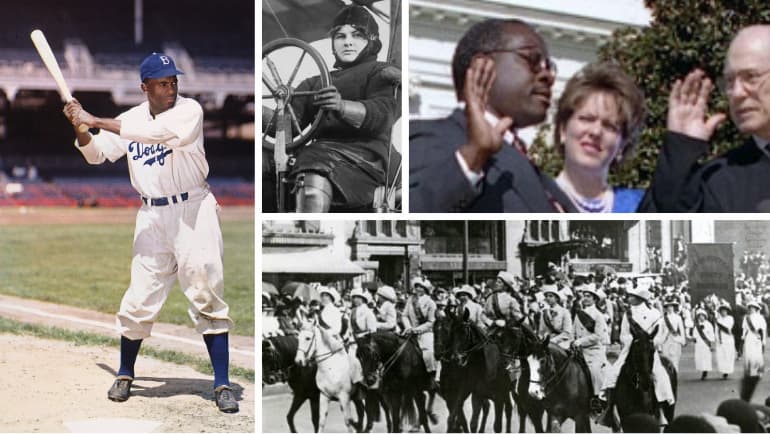Explore progressive, intersectional events that happened on October 23, in MainStream’s This Day in History.
1862: In the Tonkawa Massacre, three tribes loyal to the Union slaughter 150 members of the Confederacy-supporting Tonkawa tribe, leading to their virtual disappearance within a century.

Above: baseball legend Jackie Robinson, female pilot Blanche Stuart Scott, Supreme Court Justice Clarence Thomas and his wife Ginni during his swearing-in by Justice Byron White; and the National Women’s Rights Convention.
1910: Blanche Stuart Scott, known as the “Tomboy of the Air,” becomes the first female to publicly pilot a plane, while appearing as part of a Fort Wayne, Ind., air show.
1941: While the number of concentration camps begins to rise and the Holocaust begins in full force, Nazi Germany bans Jewish emigration from its territories. Jewish people had already been isolated in hastily constructed and overcrowded Ghettos; barred from almost all jobs; restricted in their movement; and stripped of most of their money. Within three months, the Nazi Party would begin an organized genocide to eliminate Europe’s Jewish population.
1945: Jackie Robinson becomes the first Black baseball player to sign with a major league organization, when he commits officially to the Montreal Royals, a minor league team for the Brooklyn Dodgers. After helping to desegregate baseball, Robinson will participates in the Civil Rights movement and found the Freedom National Bank, a financial institution by and for Black Americans.
1947: “It is not Russia that threatens the United States so much as Mississippi… internal injustice done to one’s brothers is far more dangerous than the aggression of strangers from abroad,” says W. E B. Du Bois in the NAACP’s Appeal to the World. This document is sent to the United Nations, asking it to help Black Americans in their struggle for civil rights. The document covers unequal legal and economic status, voting rights, systemic discrimination, and pulls from the United Nations charter’s minority protections in its request.
1973: Richard Nixon agrees to turn over White House tape recordings to Judge John Sirica, after refusing to for months. “At the heart of the matter was the question of whether the President could claim ‘executive privilege’ to block judicial or prosecutorial access to his communications — one of the most consequential constitutional tests of the era,” writes the Association of Mature American Citizens.
1991: Clarence Thomas is sworn in as a Supreme Court Justice, the second Black member of the top court in history, and the first-ever Black conservative on the nine-member panel.
Photos courtesy WikiMedia Commons

